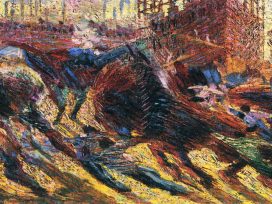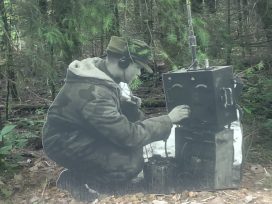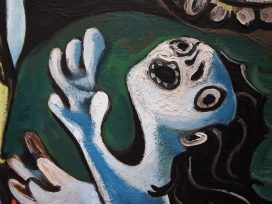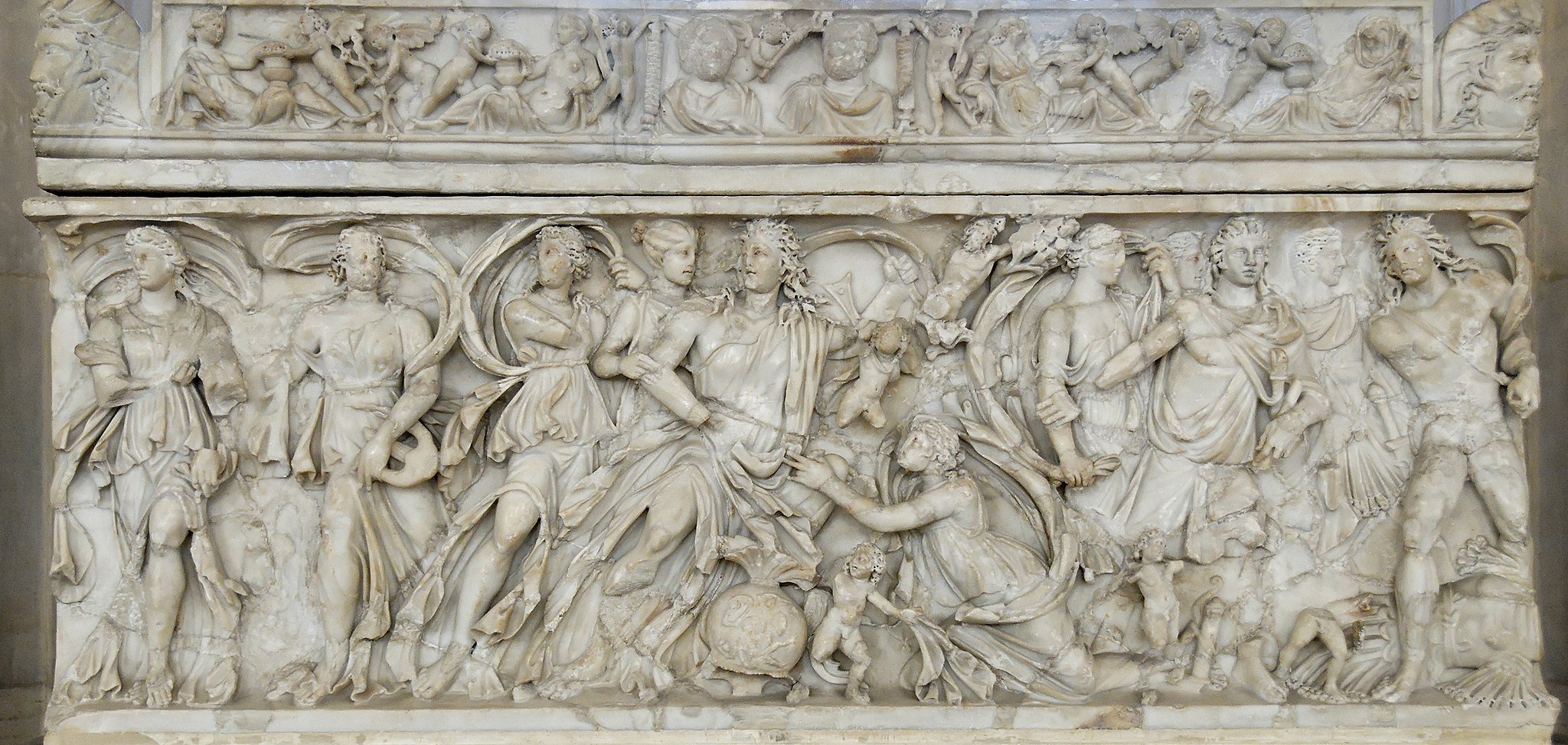
Photo by Louvre Museum CC BY 2.5 via Wikimedia Commons
The past has us in its grip. In the first place, as the locus of injustices, you could almost consider it to be an ‘elsewhere’– that should not be forgotten and, in some way or another, ought to be ‘repaired’. The history of slavery, for example; the past as a reservoir of injustice is summarized in the US, partly in name of convenience, as Black Lives Matter. By extension, World War II is another good example, of course.
For others, the past is rather a bygone era of nostalgia because it is where great achievements took place, ones that can hardly be found in the present; consider the words ‘Golden Age’ as instrumentalized by some Dutch politicians and their followers, referring to the seventeenth century as a time in which the Dutch Republic was supposedly blossoming.
So, the question is how to relate to the past. To me, it seems that detaching yourself from it would be impossible and perhaps even reprehensible; amnesia cannot become an ideal. Whether the past is a source of shame and guilt or of consolation and nostalgia, it’s always about the conclusions you draw from it and your determination in doing so, if only because what we would now call group identity can be boiled down to a collection of conclusions drawn from the past, with some rituals, customs and stories thrown into the mix.
For the past twelve months, I have voluntarily – if we can even speak of a choice – dedicated my attention increasingly to World War II. As 27 January 2020 marked the 75th anniversary of the liberation of Auschwitz, I assembled an anthology of eyewitness accounts from the camp and gave a Remembrance Day speech at De Nieuwe Kerk (the New Church), Amsterdam, on 4 May, when Dutch nationals who have died in conflict from World War II onwards are remembered in the Netherlands. I asked what the right way of dealing with one’s own and others’ pasts all the more urgently might be. But wasn’t it all a bit much? Was my interest actually an obsession? An obsession can quickly become a dungeon of its own making.
In cases of heartbreak or immense grief the advice is ‘to let go’, as both are about letting go of the past, letting go of that which cannot be held. Isn’t letting go, come to think of it, also the essence of what we call forgiveness?
In any case, I’ve been occupying myself with history, which is also my past. But at what point does history become your own? At what point can you claim history?
Ritualized retrospection is called commemoration and, in Ilse Raaijmakers and Bertine Mitima-Verloop’s fine book, De tweede minuut stilte (The second minute of silence), published by the National Center for Psychotrauma, the authors emphasize the importance of the ‘connectedness’ brought about by commemoration. Of course, solitary commemoration is what we call ‘grieving’, which is something else entirely because individual grieving doesn’t tend to have to lead to a conclusion (with the exception of crime perhaps). But commemoration, as we know it is, is at least partly founded on the necessity to prevent certain injustices from being repeated. Trauerarbeit (the work of mourning), as Freud called it, is meant to help accept what once seemed unacceptable. Commemoration might also consist of Trauerarbeit but establishing a sense of community, a shared past and, therefore, a shared future is at least as important. Commemoration is also a highly symbolic act of solidarity with victims, to commemorate is to believe that history might also be a moral lesson.
How to prevent injustice and choosing the words you utilize to prevent it are also a political matter. The past is not a neutral space. Even when dealing with World War II, where good and evil seem to be so clearly delineated, we have to conclude that battles are perpetually being waged over the past. This is inevitable. Politics isn’t only a battle over the question of how the future ought to be constructed, as far as humans have the power to construct the future. It also battles over the equally urgent question of how history should be interpreted, because this is the soil from which future expectations and ideals germinate and grow.
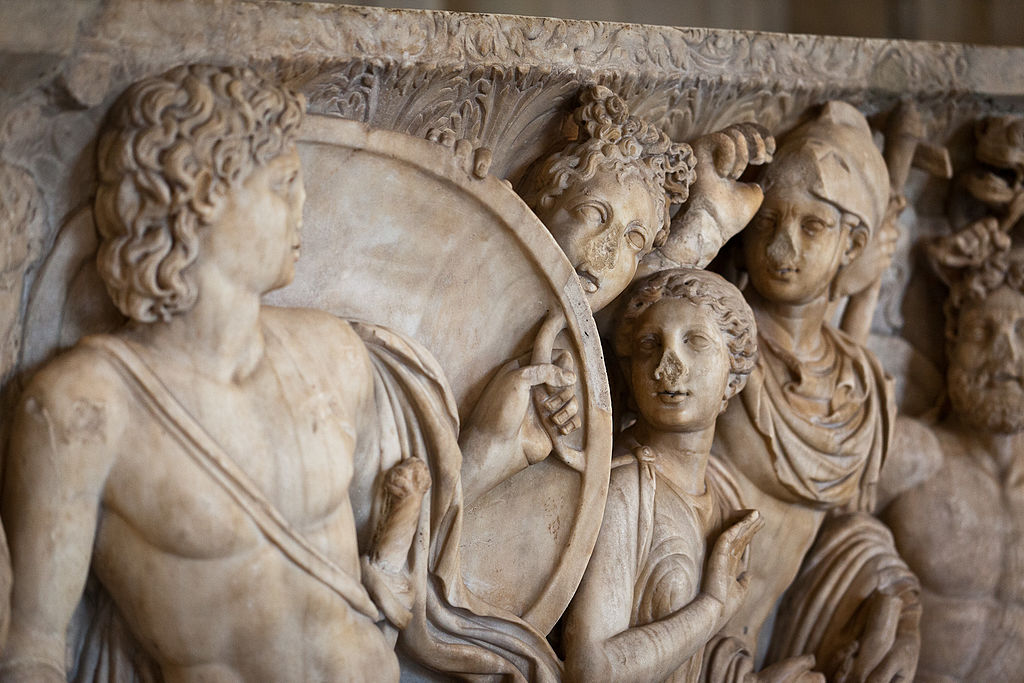
Photo by jimmyweee, CC BY 2.0 via Wikimedia Commons
The existence of the nation state might presuppose a consensus about its history, but in practice this consensus appears to be more volatile. Even in Germany, there isn’t always a clear consensus. Consider Alexander Gauland, who, in 2018, as party leader of the extreme-right AfD, reduced national socialism to mere ‘bird droppings on German history’ – a statement that places him in direct opposition to the raison d’etre of contemporary Germany.
One way or another, citizens must agree on something in order to shape the inevitable and necessary dissensions in such a way that they do not cause civil war. There is nothing wrong with polarization, but its unbridled surge threatens to disintegrate the bones of the political and civil structure, the good faith needed to coexist. Look at what is happening in the US right now, though I still find it hard to fathom a civil war breaking out there.
What can we agree on? Virtually everyone would subscribe to the idea that injustice should not have a place in society, but what kind of injustice are we talking about? People tend to centre their considerations around injustice carried out against their own group or against their own beliefs. Some people in the US consider abortion the greatest of all evils, whereas some Dutch people think Moroccan emigration into the Netherlands is abhorrent.
Sure, evil must be eradicated, but what exactly is evil, where is it located and how will we go about eradicating it? As soon as occupying yourself with the past transcends the usual platitudes – which also goes for commemoration – you find yourself in a predicament. Platitudes may feel reliable, but they provide so few answers. Let me put it differently: I have never met anyone claiming to pursue evil ends. At best, some will say that to achieve respectable goals, one must carry out less pleasant measures, the well-known doctrine of a means to an end. When our own actions can always be justified or excused, only the actions of others tend to be labeled as unjustifiable or inexcusable. This is where the wheels come off. Eradicating evil always means eradicating others.
In a penitentiary in Arnhem, where I taught writing classes some years ago, one of the inmates told me that because he smuggled Class A drugs he had taken big risks, but the profits outweighed the risks. From his account, it helped that he had not committed any violent crimes. From a moral perspective, a crime needs a victim. Sure, drugs are harmful but more harmful than legal alcohol? Let’s leave that discussion for another day.
The legal perspective is anyway very different. The law can be broken without there being a victim. Laws are written by politicians and politics, as we know, is the art of the attainable, which in turn also goes for the laws being written. Morality is less concerned with attainability, which has its perks.
The inmate who spoke about crime as a business – albeit a trade with other risks than, say, owning a herring stand – stuck with me because he spoke about his fate so differently than his fellow inmates, who saw themselves firstly as victims of the system, of the wrong crowd, of whatever. But I also sympathized with them. Whoever enters a prison knows the difficulty of recognizing the monster in the inmate, if the inmate ever was a monster. You have to be very hard-hearted to suppress any sympathy for the inmate, but the zeal with which they embraced themselves as victims was alarming. Where were the delinquents, those who see themselves as perpetrators?
The inmates also reminded me of the difficulties that arise when you give delinquents a platform, because any delinquent has the understandable urge to minimize their part in a crime and to present themselves, indeed, as a victim too.
Ever since I started writing, both in fiction and non-fiction, I’ve concerned myself with the question of how you give a voice to an offender, a person who has crossed moral borders , not because I don’t care about the victim (I certainly do) but because the victim doesn’t choose to be a victim – it happens to them. Conversely, we do assume that the malefactor had a choice. Should they not have had the chance to act differently, they would not be responsible for their actions, making it impossible to label them as an offender. Both in a legal and a moral sense we claim that choice precedes the crime or crimes make the perpetrator a criminal. In all other cases, we say they were plainly not responsible for their actions.
Here we encounter morals outweighing the law. For example, most crimes committed by the Third Reich weren’t legally punishable according to the laws at the time. However, humanity – that word is appropriate here – claimed that a Kantian idea of morality outweighed the laws and orders of a criminal regime, especially because perpetrators were usually capable of declining to follow immoral orders without punishment. Research by historian Christopher Browning, for instance, shows that certain German police officers refused to participate in mass executions without facing any consequences for their refusal. This was different for the victims. Their refusal to follow orders tended to be met with the finality of death.
Surely, the manner in which the victim deals with their fate includes choice, but it is the perpetrator that acts on the lives of one or more others, and perhaps also on his own life. Particularly when he is punished, but even without retribution, we cannot rule out that he’ll suffer guilt. That last part is uncertain – presumably, there are perpetrators who don’t suffer guilt at all over their atrocities.
Determination of the truth may not be a tool to establish justice but rather our pursuit itself to define what we deem justifiable. We want to know what happened and why; the victim wants recognition for what was done to them and in that recognition there often resides some recompense already. It is one of the reasons why we keep engaging with the past and try to determine the truth with investigations that are never resolved.
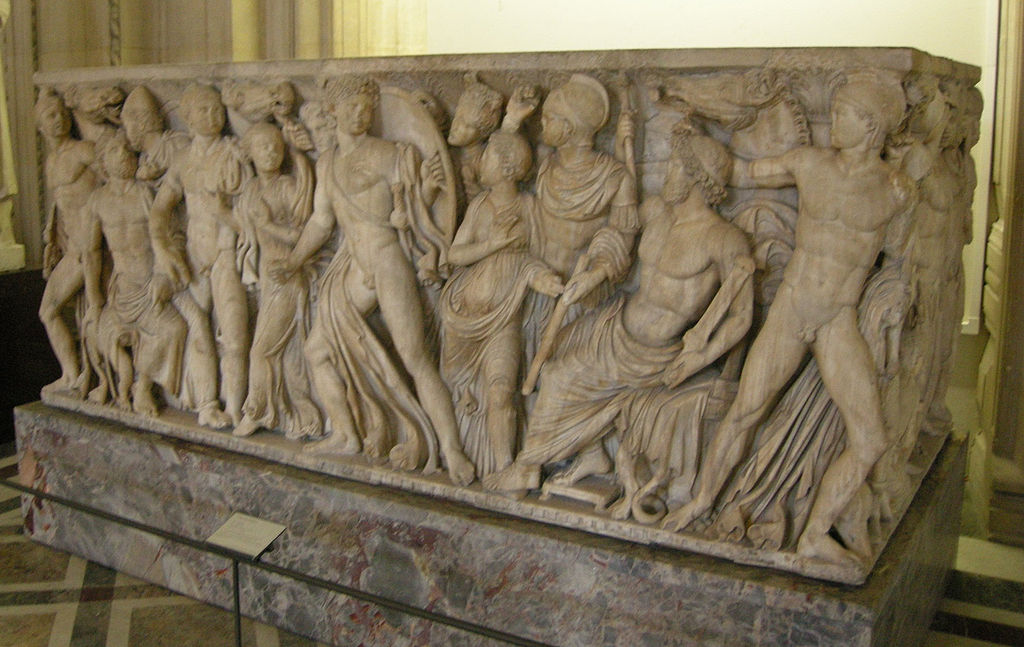
Photo y I, Sailko, CC BY-SA 3.0 via Wikimedia Commons
There is another important reason why the perspective of the criminal intrigues and challenges me. It is so easy and convenient to believe that you can never be a criminal, because you are better than others or the morality of your group is better than all other morality. Your own actions, even misdeeds, always seem understandable and forgivable. It is always other people’s deeds that are unforgivable. Superficial feelings of guilt exist in abundance, but repentance is rare. We know for example that most Germans after the war saw themselves as victims. It was not until the ’70s that widespread discussion about the Holocaust was possible.
At most, circumstances might protect you from temptations. Abel Herzberg, whose testimony on Bergen-Belsen was just as harrowing as Primo Levi’s account of Auschwitz, noted that he was invulnerable to the temptations of the time: Nazism could never appeal to him, simply because he was a Jew. Where some victims are victimized for their heritage, other victims definitely had the ‘privilege’ of being impervious to temptation, a ‘privilege’ for which they paid a gruesome price.
Identifying with the victim shows empathy but may have the side-effect that victimhood will be glorified. It’s for good reason that Joseph Brodsky warned us: ‘At all costs try to avoid granting yourself the status of the victim.’ To understand history better, to understand the world better, the task would be to see yourself as a potential perpetrator, not a potential victim.
The desire to avoid extreme injustice can only be meaningful when people are willing to take the plunge and regard themselves as a potential criminal, the significance of which is in its efficacy. The point is not to eradicate evil. On the contrary, the problem seems to be that real evil is often disguised by the pursuit of eradicating evil. The point is to acknowledge the evil within yourself, the fact that one might be seduced one day to cross certain moral borders.
It is a treacherous line of thinking, improper and unjust, to blur the line between victim and violator, but we cannot escape our responsibility to recognize criminals as fellow human beings. It is comforting to amplify the monstrous attributes of a criminal because we’d never consider ourselves to be monsters.
As far as I’m concerned, moral progress is impossible. The next generation probably won’t be any better – our morals have been around for centuries, or at least their foundations have been. Do we really think that trying to keep history alive will bestow us with the clear conscience that our ancestors lacked? We, and especially me, are innately mild sinners. I distrust anyone trying to change that, because a heavy hand waits in the wings. Whenever one tries to strong-arm sinners into conversion, people will be burned at the stake or we’ll see a contemporary equivalent take the stage.
This is not to be mistaken as a plea for lethargy. There are things to be done against the temptations people face or to which they expose themselves, not on an individual level but rather on a political level. Thieves and rapists will always be spurred on by their urges, but we’re also aware that they constitute a small minority. Captivating though they may be, especially to a novelist, I am not talking about the individual criminal. I’m talking about a political system whereby crime is no longer the case of an individual or criminal organization outside of a state’s legal confines. Instead, it is about the state itself emboldening its citizens to commit crimes on a grand scale, where the transformation of the state into a criminal organization can go completely unnoticed. Any and all states are in danger of this, even the most respectable ones.
What we can do to protect ourselves from these dangerous temptations remains a political question. Again, in order to peacefully disagree by any measure, people first need to agree on something and usually this takes the form of a constitution. But history has taught us that the constitution is not a guarantee against wholesale destruction. In post-1945 Germany, an office was set up to protect the new constitution against those keen to destroy it. But, if enough voters and just one shrewd politician are keen to destroy the pillars of civil society, then such an office might not even be enough.
So even though I’m skeptical about individual moral progress, the electorate does not get off scot-free. While people should not be exposed to certain temptations, such temptations should never become a legitimate excuse for destroying the society that makes it possible for citizens to disagree with one another without bloodshed. Here in particular we should acknowledge how identifying with the criminal should elicit prudence, how people should not only see themselves as someone in need of protection but should also be prepared to view themselves as someone other people ought to be protected from.
Some people in the Netherlands told me that commemorations are not a political affair. According to them, they are meant to unify the nation. Of course, whether we like it or not, all official commemorations have a unifying character, but it is a pious lie that numbs the pain at the core of commemoration, ensuring that no one will get their feelings hurt and people can safely doze off during the ceremony.
What can we agree upon to shape our area of disagreement in a way that won’t leave or, let me be realistic, will rarely leave victims? This is the social, political question that precedes commemoration.
Again, we shape our future by relating to the past, by drawing from the past, by distancing ourselves from it, or by doing the opposite. It cannot be emphasized enough that the past is not a neutral place and never will be. History is and always will remain a battleground to secure very real contemporary and future intentions and goals.







